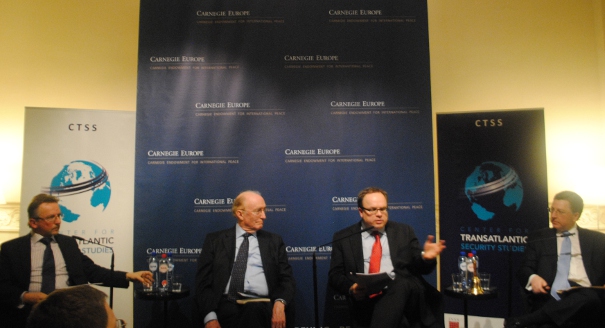Registration
You will receive an email confirming your registration.
IMGXYZ3461IMGZYXThe success of the North Atlantic Treaty Organization's (NATO) recent operation in Libya cannot paper over ongoing concerns within the Alliance over common goals and commitments, and raises new questions about solidarity within NATO and America's commitment to Alliance leadership.
Ambassador Robert E. Hunter, Ambassador Kurt D. Volker, and Dr. Karl-Heinz Kamp discussed how to strike a more balanced transatlantic relationship. This event marked the launch of The Transatlantic Bargain, a joint study conducted by the National Defense University's Center for Transatlantic Security Studies, Washington, D.C., and the NATO Defense College, Rome. Carnegie Europe's Jan Techau moderated.
A New Transatlantic Bargain?
- The Initial Bargain: Often described as the most successful military alliance in history, participants explained that NATO has been centered on a “transatlantic bargain” based on each side’s willingness to sacrifice part of their interest to the other for a common benefit.
- The Transatlantic Relationship in a Changing World: One panelist argued that the transatlantic bargain has shifted dramatically after the fall of the Berlin Wall on November 9, 1989 and the terrorist attacks on September 11, 2001. The Alliance has also been tested in recent years by the Iraq war and over perceptions of its relations with Russia, Georgia, and Ukraine. Moreover, the panelist argued that the Alliance is no longer the most important organizing factor in national defense and foreign policy. Increasingly, the United States looks strategically towards Asia and other global hot spots, while the European focus is shifting to the building of its internal institutions, particularly given the current economic context.
- The Future of Transatlantic Relations: Several panelists argued that NATO remains a necessary enabler at a time when new threats make it increasingly difficult for countries to act unilaterally. However, one speaker argued that the ‘old bargain’ must be restructured and based on a clear, global, and integrated approach, similar to that presented by Barack Obama during his speech to the Australian Parliament in November 2011. Another panelist insisted on the continued significance of the transatlantic relationship by declaring that the United States will remain a European power: it will continue to be rooted to the continent because the great repository of assets for doing the things the United States wants done in the world is with North Atlantic countries.
A Way Forward
Panelists agreed that although there is no silver bullet to fix the current difficulties in the transatlantic relationship, it is essential that leaders on both sides believe in the importance of a successful transatlantic relationship in a changing world. The Transatlantic Bargain identifies seven concrete recommendations for action that center on furthering aspects of NATO’s 2012 Strategic Concept:
- Focus on Post-2014 Afghanistan: NATO is currently planning the handover of responsibilities to Afghan leadership in 2014. More attention should be given to the nature of the Alliance’s continuing role in the country. The possibility of an extended military presence should not be discarded before Afghan security services are ready to fully takeover.
- Make NATO the Forum for Allied Security Debate: NATO should be used increasingly as a forum for allies to consult on all security issues.
- Coordinate with the International Community: NATO must connect more closely with other international organizations, in particular with the United Nations, the African Union, and the League of Arab States.
- Remain Engaged with the Arab World: Recent political developments in the Middle East and North Africa have shed a new light on the importance of NATO’s partnerships with countries in the Arab world. The Alliance should seize this unique opportunity to contribute to the democratic transformations taking place in certain countries.
- Make the NATO Response Force a Priority: The NATO Response Force is the Alliance’s only means to act quickly and decisively by giving decision makers a genuine collective military option. Member states should renew their commitment to the maintenance of a high readiness NATO Response Force on a permanent basis.
- Ensure that Allies can Deliver on Their Declared Military Capabilities: Member states must have full confidence in the availability of capabilities declared by others and issues of readiness and political will must be addressed in advance of potential military action, in order to guarantee mutual trust.
- Address Funding Shortfalls:The issue of funding sufficiency cannot be ignored. The Alliance must lower its ambitions and strengthen its commitment to two percent of GDP from Member states while allowing time for budgetary recovery from the financial and euro crises.
